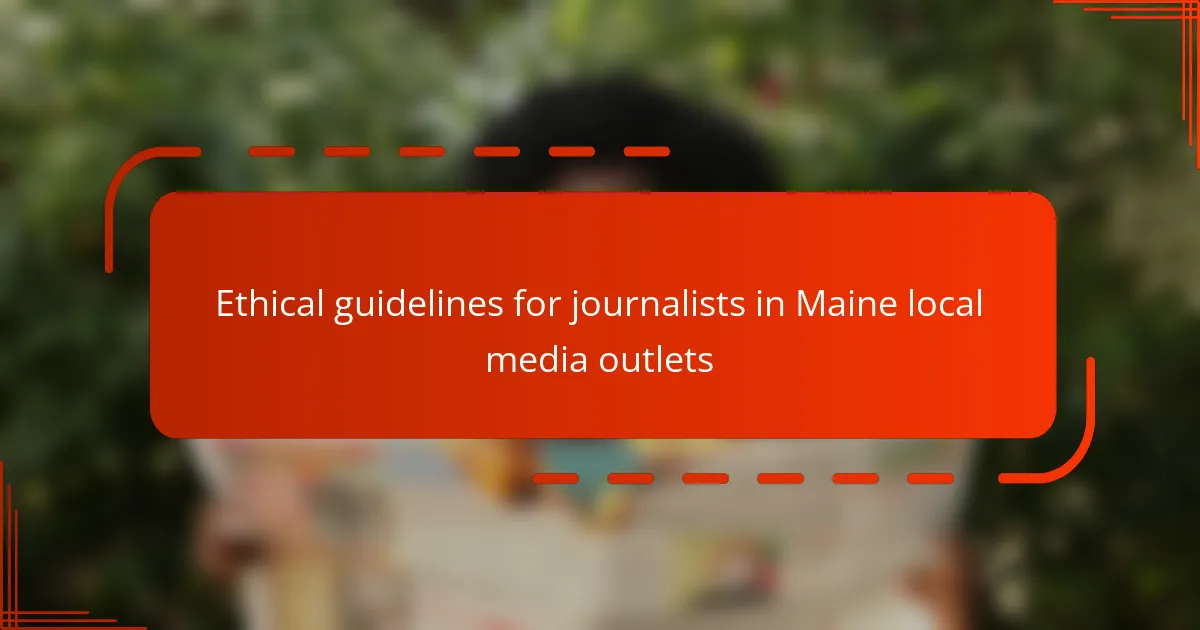Journalists in Maine local media outlets follow ethical guidelines that prioritize accuracy, fairness, and integrity in their reporting. These guidelines mandate the verification of information, the distinction between fact and opinion, and the avoidance of conflicts of interest. Additionally, journalists are required to respect individual privacy, correct errors transparently, and present diverse viewpoints to maintain accountability. The article outlines the key components of ethical journalism in Maine, the challenges faced by journalists, including conflicts of interest and the pressure for quick publication, as well as the impact of misinformation on local media practices.

What are the ethical guidelines for journalists in Maine local media outlets?
Journalists in Maine local media outlets adhere to ethical guidelines that emphasize accuracy, fairness, and integrity. These guidelines require journalists to verify information before publication. They must distinguish between fact and opinion in their reporting. Journalists are expected to avoid conflicts of interest and disclose any potential biases. They should respect the privacy of individuals unless public interest justifies intrusion. Additionally, journalists must correct errors promptly and transparently when they occur. These principles help maintain trust and credibility within the community.
How do these guidelines ensure journalistic integrity?
These guidelines ensure journalistic integrity by establishing standards for accuracy, fairness, and accountability. They require journalists to verify information before publication. This process helps prevent the spread of misinformation. The guidelines also promote transparency in sourcing. This allows the audience to understand the basis of reported information. Furthermore, they emphasize the importance of avoiding conflicts of interest. This maintains trust between journalists and the public. By adhering to these principles, journalists can uphold their ethical responsibilities. Research indicates that adherence to ethical guidelines enhances public trust in media.
What principles form the foundation of these ethical guidelines?
The principles that form the foundation of ethical guidelines for journalists in Maine local media outlets include accuracy, fairness, and accountability. Accuracy emphasizes the importance of reporting facts correctly and verifying information before publication. Fairness involves presenting multiple viewpoints and avoiding bias in reporting. Accountability requires journalists to take responsibility for their work and address any errors transparently. These principles ensure that journalism maintains integrity and serves the public interest effectively.
How do these principles apply to everyday reporting?
Ethical principles apply to everyday reporting by guiding journalists in their decision-making processes. These principles ensure accuracy, fairness, and accountability in news coverage. Journalists must verify information before publication to maintain credibility. They should provide balanced perspectives, representing diverse viewpoints in their stories. Transparency about sources and methods fosters trust with the audience. Adhering to these ethical guidelines helps prevent misinformation and promotes responsible journalism. In Maine, local media outlets emphasize these principles to build community trust and uphold journalistic integrity.
Why are ethical guidelines important for local journalism in Maine?
Ethical guidelines are crucial for local journalism in Maine to ensure credibility and trust. They help maintain journalistic integrity by promoting accuracy and fairness in reporting. Adhering to these guidelines protects journalists from conflicts of interest. Ethical standards also foster accountability to the community they serve. In Maine, where local news is vital for informed citizenry, these guidelines are essential for transparency. They guide journalists in making ethical decisions, particularly in sensitive situations. By following ethical principles, local journalists can uphold the public’s right to know while respecting individual privacy. This balance is particularly important in smaller communities where relationships are closely knit.
What impact do ethical guidelines have on public trust?
Ethical guidelines significantly enhance public trust in journalism. They establish standards for transparency, accuracy, and accountability. When journalists adhere to these guidelines, they provide reliable information. This reliability fosters audience confidence. A study by the Pew Research Center found that 71% of Americans believe ethical journalism is essential for trust. Ethical practices also promote fairness and impartiality. This further strengthens the relationship between media outlets and their audiences. Consequently, adherence to ethical guidelines is crucial for maintaining public trust in local media.
How do these guidelines protect journalists and their sources?
These guidelines protect journalists and their sources by establishing clear standards for ethical reporting. They promote transparency and accountability, which fosters trust between journalists and the public. By ensuring confidentiality, these guidelines allow sources to share sensitive information without fear of exposure. This protection encourages whistleblowers and others to come forward, enhancing the quality of reporting. Furthermore, adherence to these guidelines helps journalists navigate legal challenges, safeguarding their rights and those of their sources. For instance, in Maine, the shield law provides legal protection for journalists against revealing confidential sources in court. This legal framework reinforces the importance of ethical standards in maintaining journalistic integrity and public trust.

What are the key components of ethical journalism in Maine?
Key components of ethical journalism in Maine include accuracy, fairness, and accountability. Journalists must strive for factual reporting and verify information before publication. Fairness requires presenting diverse viewpoints and avoiding bias. Accountability involves taking responsibility for the content published and correcting errors promptly. The Maine Association of Broadcasters emphasizes these principles in its ethical guidelines. These components ensure trust and integrity in local media.
How do fairness and accuracy play a role in journalism ethics?
Fairness and accuracy are foundational principles in journalism ethics. Fairness ensures that all sides of a story are represented. This promotes balanced reporting and prevents bias. Accuracy involves presenting facts correctly and verifying information before publication. It builds trust with the audience and maintains credibility. Studies show that accurate reporting leads to higher audience trust levels, which is essential for media integrity. For instance, the Society of Professional Journalists emphasizes these principles in their Code of Ethics, highlighting their importance in fostering public confidence in journalism.
What practices promote fairness in reporting?
Fairness in reporting is promoted through several key practices. These include ensuring balanced coverage by presenting multiple viewpoints. Journalists should verify facts before publication to maintain accuracy. They must avoid conflicts of interest that could bias reporting. Transparency about sources enhances credibility and trust. Additionally, journalists should adhere to ethical standards set by professional organizations. Following these practices leads to more equitable and responsible journalism. For instance, the Society of Professional Journalists emphasizes the importance of fairness and accuracy in reporting.
How can journalists ensure accuracy in their work?
Journalists can ensure accuracy in their work by thoroughly verifying information before publication. This includes cross-checking facts with multiple reliable sources. Journalists should also seek confirmation from primary sources when possible. Utilizing fact-checking tools and resources can further enhance accuracy. Maintaining transparency about sources and methods is crucial for credibility. Adhering to established ethical guidelines, such as those from the Society of Professional Journalists, supports accuracy. Continuous training in journalism ethics and standards helps journalists stay informed. Engaging in peer reviews can provide additional oversight and catch potential errors.
What responsibilities do journalists have towards their audience?
Journalists have a responsibility to provide accurate and truthful information to their audience. This ensures that the public is informed about significant events and issues. Journalists must verify facts before publication to maintain credibility. They should also present information in a fair and balanced manner. Transparency about sources and methods is essential to build trust with the audience. Journalists must avoid conflicts of interest that could compromise their integrity. Additionally, they have a duty to respect privacy and avoid sensationalism. Upholding these responsibilities contributes to an informed and engaged public.
How should journalists handle sensitive topics?
Journalists should approach sensitive topics with care and empathy. They must research thoroughly to understand the context. Accuracy is paramount; misinformation can cause harm. Journalists should consider the potential impact on individuals and communities. They should seek consent when interviewing vulnerable subjects. Providing trigger warnings can help prepare audiences for distressing content. Sensitivity to cultural differences is essential in reporting. Finally, journalists should be transparent about their sources and methods to maintain trust.
What role does transparency play in building audience trust?
Transparency is crucial for building audience trust. It allows audiences to understand the motivations and processes behind content creation. When journalists are open about their sources, methods, and potential biases, they foster credibility. A 2020 study by the American Press Institute found that 73% of readers trust news organizations more when they are transparent. Transparency also encourages accountability, as it invites scrutiny and feedback from the audience. This open communication can lead to stronger relationships between journalists and their communities. Ultimately, transparency is a foundational element that enhances trust in local media outlets.

What challenges do journalists in Maine face regarding ethics?
Journalists in Maine face several ethical challenges. These include maintaining objectivity in reporting. The state’s small community can lead to conflicts of interest. Journalists may know their sources personally, complicating impartiality. Additionally, there is pressure to publish quickly, which can compromise fact-checking. Limited resources in local media may lead to ethical shortcuts. The rise of misinformation poses a significant challenge as well. Journalists must navigate the fine line between reporting and sensationalism. Upholding transparency with audiences is also essential in this context.
How do external pressures influence journalistic ethics?
External pressures significantly influence journalistic ethics by shaping the decision-making processes of journalists. These pressures can come from various sources, including government entities, advertisers, and public opinion. For instance, when media outlets rely heavily on advertising revenue, they may prioritize content that pleases advertisers over objective reporting. This can lead to biased coverage or the omission of critical stories. Additionally, journalists may face pressure from political figures who threaten to withdraw access or funding if coverage is unfavorable. Studies show that such external influences can compromise journalistic integrity, leading to a decline in public trust. Research by the Pew Research Center indicates that 70% of journalists believe external pressures impact their work. Thus, external pressures can distort ethical journalism by prioritizing interests over factual reporting.
What are the common ethical dilemmas journalists encounter?
Journalists commonly encounter ethical dilemmas related to accuracy, fairness, and conflicts of interest. Accuracy involves ensuring that all information reported is truthful and well-sourced. Fairness requires journalists to present multiple viewpoints in their stories. Conflicts of interest arise when journalists have personal connections that could influence their reporting.
Other dilemmas include privacy concerns, where journalists must balance the public’s right to know against individuals’ rights to privacy. Sensationalism is another issue, as journalists may feel pressured to produce eye-catching stories that compromise ethical standards. Additionally, the challenge of reporting on vulnerable populations raises ethical questions about representation and exploitation.
These dilemmas are critical as they impact the credibility of journalism and the trust of the public. Ethical guidelines are essential to navigate these challenges effectively.
How can journalists navigate conflicts of interest?
Journalists can navigate conflicts of interest by disclosing any potential conflicts to their editors and audiences. Transparency is essential in maintaining credibility. They should refrain from covering stories where personal interests may compromise objectivity. Establishing clear ethical guidelines within their organizations helps mitigate risks. Regular training on ethical standards can reinforce awareness of conflicts. Journalists should seek guidance from ethics boards or professional organizations when in doubt. Adhering to these practices supports fair reporting and public trust.
What resources are available for journalists to uphold ethical standards?
Journalists have various resources to uphold ethical standards. These include professional organizations like the Society of Professional Journalists (SPJ) which provides a Code of Ethics. The American Press Institute offers training and guidelines for ethical journalism practices. Additionally, the Poynter Institute provides resources, workshops, and articles on ethical reporting. State-specific resources, such as Maine’s Press Association, also promote ethical journalism through workshops and networking opportunities. Access to these resources helps journalists navigate ethical dilemmas and maintain credibility in their reporting.
How can training and workshops improve ethical practices?
Training and workshops enhance ethical practices by providing journalists with essential knowledge and skills. They offer structured learning environments where ethical dilemmas can be discussed and analyzed. Participants gain insights into ethical standards and guidelines relevant to their field. Workshops often include real-world case studies that illustrate the consequences of ethical lapses. This practical approach helps journalists understand the importance of integrity in their reporting. Research shows that ongoing training leads to improved decision-making and accountability among media professionals. A study by the Pew Research Center found that 71% of journalists believe ethics training positively impacts their work. This demonstrates the effectiveness of training in fostering a culture of ethical journalism.
What role do professional organizations play in supporting ethical journalism?
Professional organizations play a crucial role in supporting ethical journalism. They establish codes of ethics that guide journalists in their reporting. These organizations provide training and resources to enhance journalistic integrity. They also advocate for press freedom and the protection of journalists. Furthermore, they offer platforms for discussion about ethical challenges in journalism. By promoting accountability, these organizations help maintain public trust in the media. Research indicates that adherence to ethical standards improves the quality of journalism. For instance, the Society of Professional Journalists emphasizes transparency and accuracy as core principles.
What best practices can journalists follow to maintain ethical standards?
Journalists can maintain ethical standards by adhering to principles of accuracy, fairness, and transparency. They should fact-check their information before publication. Ensuring that sources are credible is crucial. Journalists must also avoid conflicts of interest. They should disclose any potential biases that may affect their reporting. Respecting the privacy of individuals is essential, especially in sensitive situations. Additionally, journalists should strive for balanced coverage, presenting multiple viewpoints. Following these practices helps uphold the integrity of journalism and fosters public trust.
The main entity of the article is the ethical guidelines for journalists in Maine local media outlets. The article outlines the principles of accuracy, fairness, and accountability that guide journalists in their reporting practices. It emphasizes the importance of verifying information, avoiding conflicts of interest, and maintaining transparency to foster public trust. Additionally, the article discusses the challenges faced by journalists, including external pressures and ethical dilemmas, while highlighting the resources and training available to uphold ethical standards in journalism.
